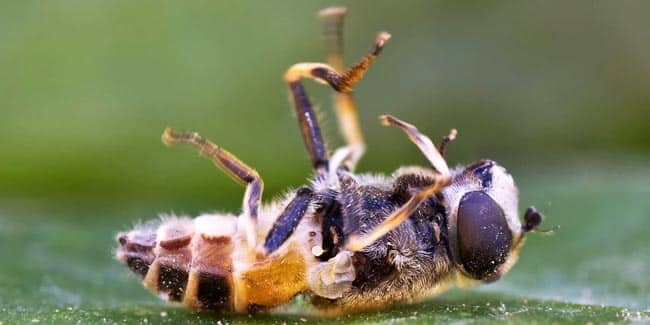
by Ian Angus
My articles on the rapid decline of Earth’s most numerous animals have been widely republished. Read them here: Part One, Part Two, Part Three, Part Four. This news release, issued on October 12 by University College London (UCL), confirms and further emphasizes the dangers posed by the massive destruction of insect life.
Coffee and cocoa plants at risk from pollinator loss
Tropical crops such as coffee, cocoa, watermelon and mango may be at risk due to the loss of insect pollinators, finds a new study led by UCL and Natural History Museum researchers.
Published in Science Advances, the study explores the intricate interplay between climate change, land use change, and their impact on pollinator biodiversity, ultimately revealing significant implications for global crop pollination.
The study, which compiled data from 1,507 crop growing sites around the world and catalogued 3,080 insect pollinator species, exposes a concerning trend – the combined pressures of climate change and agricultural activities have led to substantial declines in both the abundance and richness of insect pollinators.
Crops which depend on pollination by animals to some degree make up around 75% of crops. The model created by the research team looked at which pollination dependent crops were most at threat all the way up to 2050 in the hope of providing a warning to both the agricultural and conservation communities.
Lead author Dr. Joe Millard, who completed the study as part of his PhD at the UCL Centre for Biodiversity & Environment Research, before moving to the Natural History Museum London, said:
“Our research indicates that the tropics are likely most at risk when it comes to crop production from pollinator losses, primarily due to the interaction of climate change and land use. While localized risks are highest in regions like sub-Saharan Africa, northern South America, and south-east Asia, the implications of this extend globally via the trade in pollination dependent crops.”
The tropics were identified as having a heightened vulnerability to the interaction of climate change and land use, meaning crops such a coffee, cocoa, mango and watermelon which all rely on insect pollination are at the greatest risk. These crops play vital roles in both local economies and global trade and their reduction could cause increased income insecurity for millions of small-scale farmers in these regions.
Dr. Millard continued:
“As insects decline, due to being unable to cope with the interacting effects of climate change and land use, so too will the crops that rely on them as pollinators. In some cases, these crops could be pollinated by hand but this would require more labor and more cost.”
The study also underscores the importance of pollinator abundance and richness in delivering pollination services. It is evident that efforts to mitigate climate change could significantly reduce the risk to future crop production, but challenges remain.
As the world grapples with the intricate web of climate change, land use, and biodiversity loss, this study serves as a stark reminder of the interconnectedness of ecosystems and the critical role played by pollinators in sustaining agriculture and food security.
Senior author Dr. Tim Newbold (UCL Centre for Biodiversity & Environment Research, UCL Biosciences) said:
“Climate change poses grave threats not only to the natural environment and biodiversity, but also to human well-being, as the loss of pollinators can threaten the livelihoods of people across the globe who depend on crops that depend on animal pollination. Our findings underscore the urgent need to take global action to mitigate climate change, alongside efforts to slow down land use changes and protect natural habitats to avoid harming insect pollinators.”
This is the Abstract of the study described in UCL’s News Release.
Key tropical crops at risk from pollinator loss due to climate change and land use
Science Advances, October 12, 2023
Insect pollinator biodiversity is changing rapidly, with potential consequences for the provision of crop pollination. However, the role of land use–climate interactions in pollinator biodiversity changes, as well as consequent economic effects via changes in crop pollination, remains poorly understood.
We present a global assessment of the interactive effects of climate change and land use on pollinator abundance and richness and predictions of the risk to crop pollination from the inferred changes. Using a dataset containing 2673 sites and 3080 insect pollinator species, we show that the interactive combination of agriculture and climate change is associated with large reductions in insect pollinators.
As a result, it is expected that the tropics will experience the greatest risk to crop production from pollinator losses. Localized risk is highest and predicted to increase most rapidly, in regions of sub-Saharan Africa, northern South America, and Southeast Asia. Via pollinator loss alone, climate change and agricultural land use could be a risk to human well-being.


